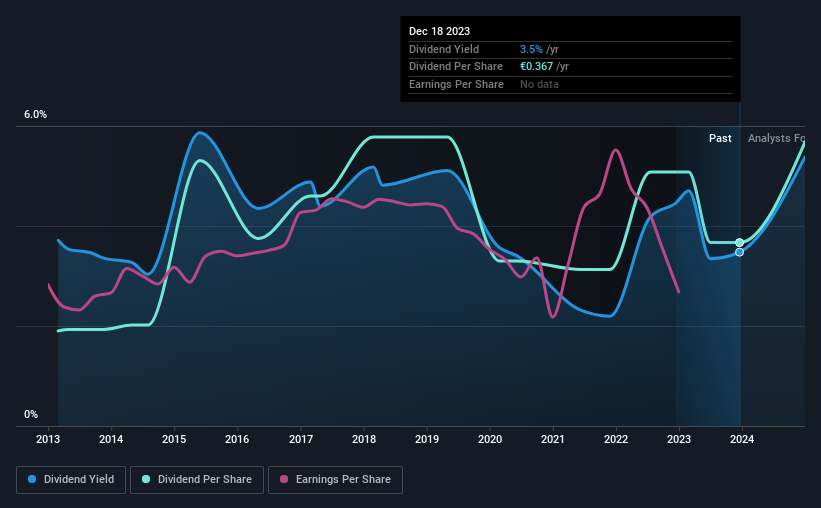- Spain
- /
- Medical Equipment
- /
- BME:PRM
Here's Why We're Wary Of Buying Prim's (BME:PRM) For Its Upcoming Dividend

Prim, S.A. (BME:PRM) stock is about to trade ex-dividend in 3 days. The ex-dividend date is one business day before a company's record date, which is the date on which the company determines which shareholders are entitled to receive a dividend. The ex-dividend date is important as the process of settlement involves two full business days. So if you miss that date, you would not show up on the company's books on the record date. Therefore, if you purchase Prim's shares on or after the 22nd of December, you won't be eligible to receive the dividend, when it is paid on the 28th of December.
The company's next dividend payment will be €0.089 per share, on the back of last year when the company paid a total of €0.37 to shareholders. Based on the last year's worth of payments, Prim stock has a trailing yield of around 3.5% on the current share price of €10.55. We love seeing companies pay a dividend, but it's also important to be sure that laying the golden eggs isn't going to kill our golden goose! That's why we should always check whether the dividend payments appear sustainable, and if the company is growing.
See our latest analysis for Prim
If a company pays out more in dividends than it earned, then the dividend might become unsustainable - hardly an ideal situation. Prim paid out 75% of its earnings to investors last year, a normal payout level for most businesses. Yet cash flow is typically more important than profit for assessing dividend sustainability, so we should always check if the company generated enough cash to afford its dividend. Prim paid out more free cash flow than it generated - 136%, to be precise - last year, which we think is concerningly high. We're curious about why the company paid out more cash than it generated last year, since this can be one of the early signs that a dividend may be unsustainable.
While Prim's dividends were covered by the company's reported profits, cash is somewhat more important, so it's not great to see that the company didn't generate enough cash to pay its dividend. Were this to happen repeatedly, this would be a risk to Prim's ability to maintain its dividend.
Click here to see how much of its profit Prim paid out over the last 12 months.

Have Earnings And Dividends Been Growing?
Businesses with shrinking earnings are tricky from a dividend perspective. If earnings decline and the company is forced to cut its dividend, investors could watch the value of their investment go up in smoke. Prim's earnings per share have fallen at approximately 6.5% a year over the previous five years. When earnings per share fall, the maximum amount of dividends that can be paid also falls.
The main way most investors will assess a company's dividend prospects is by checking the historical rate of dividend growth. Since the start of our data, 10 years ago, Prim has lifted its dividend by approximately 6.8% a year on average. Growing the dividend payout ratio while earnings are declining can deliver nice returns for a while, but it's always worth checking for when the company can't increase the payout ratio any more - because then the music stops.
To Sum It Up
Is Prim an attractive dividend stock, or better left on the shelf? Prim had an average payout ratio, but its free cash flow was lower and earnings per share have been declining. Overall it doesn't look like the most suitable dividend stock for a long-term buy and hold investor.
With that in mind though, if the poor dividend characteristics of Prim don't faze you, it's worth being mindful of the risks involved with this business. To that end, you should learn about the 4 warning signs we've spotted with Prim (including 1 which can't be ignored).
If you're in the market for strong dividend payers, we recommend checking our selection of top dividend stocks.
New: Manage All Your Stock Portfolios in One Place
We've created the ultimate portfolio companion for stock investors, and it's free.
• Connect an unlimited number of Portfolios and see your total in one currency
• Be alerted to new Warning Signs or Risks via email or mobile
• Track the Fair Value of your stocks
Have feedback on this article? Concerned about the content? Get in touch with us directly. Alternatively, email editorial-team (at) simplywallst.com.
This article by Simply Wall St is general in nature. We provide commentary based on historical data and analyst forecasts only using an unbiased methodology and our articles are not intended to be financial advice. It does not constitute a recommendation to buy or sell any stock, and does not take account of your objectives, or your financial situation. We aim to bring you long-term focused analysis driven by fundamental data. Note that our analysis may not factor in the latest price-sensitive company announcements or qualitative material. Simply Wall St has no position in any stocks mentioned.
About BME:PRM
Prim
Provides health technology, mobility, and health care products in Spain.
Proven track record with adequate balance sheet.

